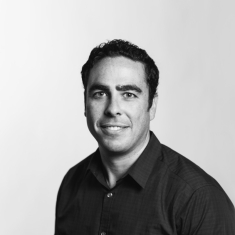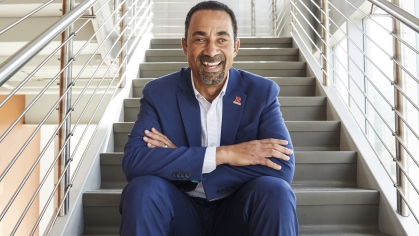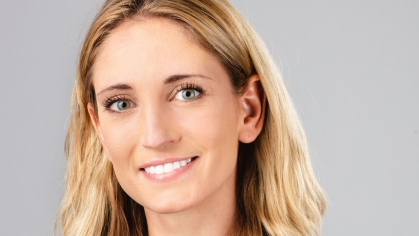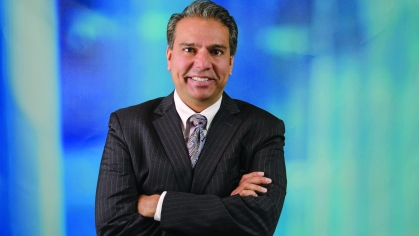
After graduating in 1997 from the School of Engineering with a BS from the Department of Chemical and Biochemical engineering (CBE), Ramsey Homsany received his JD from NYU Law. He has spent his career building high-performance teams and technology companies. He practiced in Wilson Sonsini Goodrich & Rosati’s technology transaction group before serving as vice president and general counsel at Google, where he managed its commercial legal groups and Latin American legal team and negotiated some of the internet’s largest partnerships. As general counsel at Dropbox, he had roles leading its communications, public policy & government affairs, human resources, legal, and trust and security teams. During his five years there, Dropbox made history as the fastest SAAS company to earn one billion dollars in revenue. In 2017, he tapped into his CBE roots by co-founding Octant, a next generation drug discovery company. He delivered the School of Engineering Convocation address in 2022 and is currently a member of the school’s Industry Advisory Board.
What have you valued most about your engineering education?
I became an engineer because I wanted to understand the world. And my engineering education prepared me for critical thinking, problem-solving, and just about any challenge that has come my way. But the thing I love about Rutgers University is its promise of social mobility. It changed my life as the son of immigrants.
The thing I love about Rutgers is its promise of social mobility. It changed my life as the son of immigrants.
-Ramsey Homsany
Why law school?
I realized by senior year that I didn’t want to be a practicing engineer. It was a big leap for me to go to law school. I was a math and science junkie until that point, but I really wanted to explore the other side of my brain.
In my required Rutgers engineering ethics class, we studied things like the 1984 Bhopal, India gas leak and the effects of asbestos and read legal cases. I learned there were not enough lawyers with technical backgrounds and not enough engineers who understood legal issues.
What did you gain from your experience as a practicing lawyer?
It taught me to think and care about society and to factor into our work the ethical implications of things we create.
Eventually, though, I realized I wanted to build stuff. I wanted to apply new ideas to build new businesses, to make new technologies come alive. I was scared to leave my job at a top law firm to go to this little company called Google. People told me I was crazy. It was one of the best decisions I ever made.
I got on board with Dropbox even earlier than I had with Google – the company was around 50 employees. And so, I played a bigger part in building the company. We were the fastest Software-as-a-Service, or SAAS, company in history to earn $1 billion in revenue. But I’m even more proud of all the work we did behind the scenes to be worthy of our users’ trust -- to improve our security, and to ensure that our users’ information was safe.
What else has greatly influenced your career path?
The American spirit of entrepreneurship – the triumph of hope over risk – created Google and Dropbox. And it inspired me and my current colleagues to create a startup of our own.
How would you describe your startup Octant?
We’re a drug discovery company using high throughput cellular engineering and nanoscale chemistry approaches to develop next-generation small molecule drugs.
We’re doing things I could only dream about when I was studying biochemical engineering at Rutgers. We’re programming living human cells to unlock key insights that will help us build a new generation of medicines.
Our technology has also been used by other companies and institutions to develop a low cost scalable Covid test, just as Rutgers has done. Over a million tests have been conducted using our technology.
While we also have a partnership with Bristol Myers Squibb, bringing drugs to market takes many years. We’re still a pre-clinical company.
As a chemical engineering major, you have come full circle with Octant. What led you to establish it?
My experience at Dropbox expanded my horizons, as I got a great education in building a company. I’ve thrived in driving a wedge into a new space, rather than maintaining or sustaining an existing space.
My attitude was “count your blessings” for my new career freedom. I didn’t have anything to prove anymore, and I could focus on a path where I could really contribute.
Synthetic biology and its ability to modify life forms blew my mind. We can focus using new technologies to build better cellular systems to understand disease patterns – and then find solutions for drugs to combat disease.
What excites you most about this field?
I’m just extremely excited about this field and working on something with the potential to help millions of people. One of the proudest things I could do is help build a drug that someday people around the world could use to make their lives better. I can’t imagine a better contribution – other than raising my two children.
How do you see your role on the SoE Industry Advisory Board?
I do believe that the School of Engineering in particular should be a hotbed for entrepreneurial talent. We need more entrepreneurs to do disruptive things in society, and by doing so, to bring science and technology together in a positive way.
Most schools tend to cover entrepreneurship in their business schools, but I believe it should be in the core curriculum and culture of technical schools as well.
What advice do you have for today’s Rutgers Engineering students?
Take risks. Build things. Work hard. And have fun.


